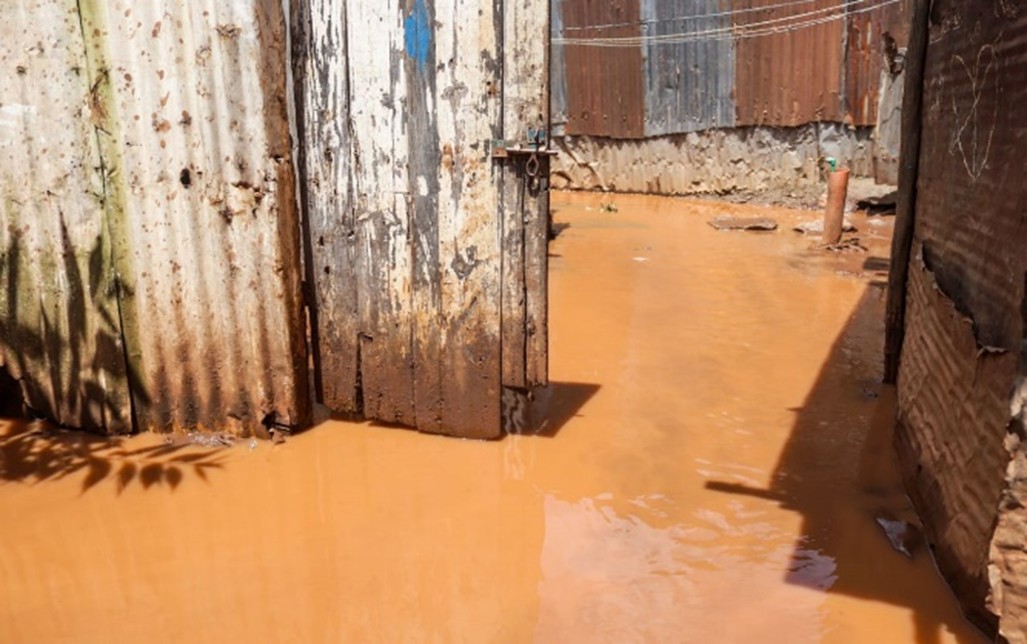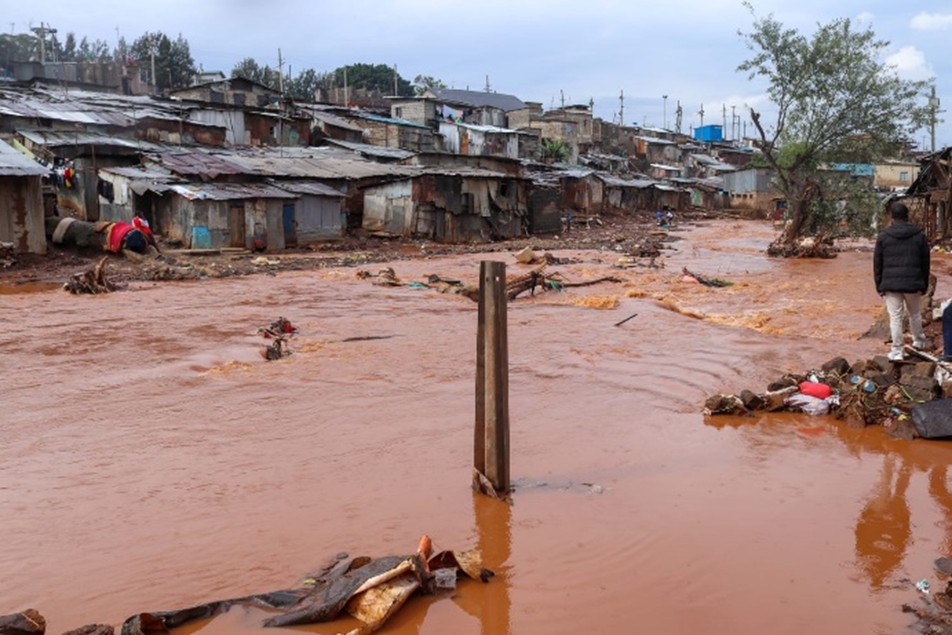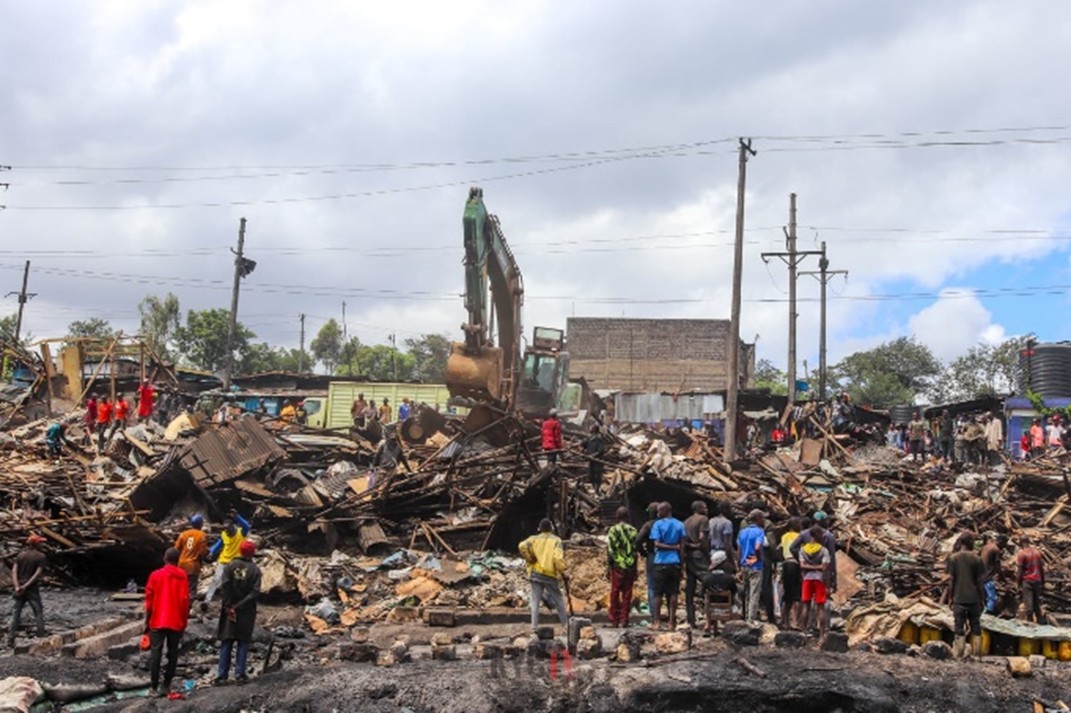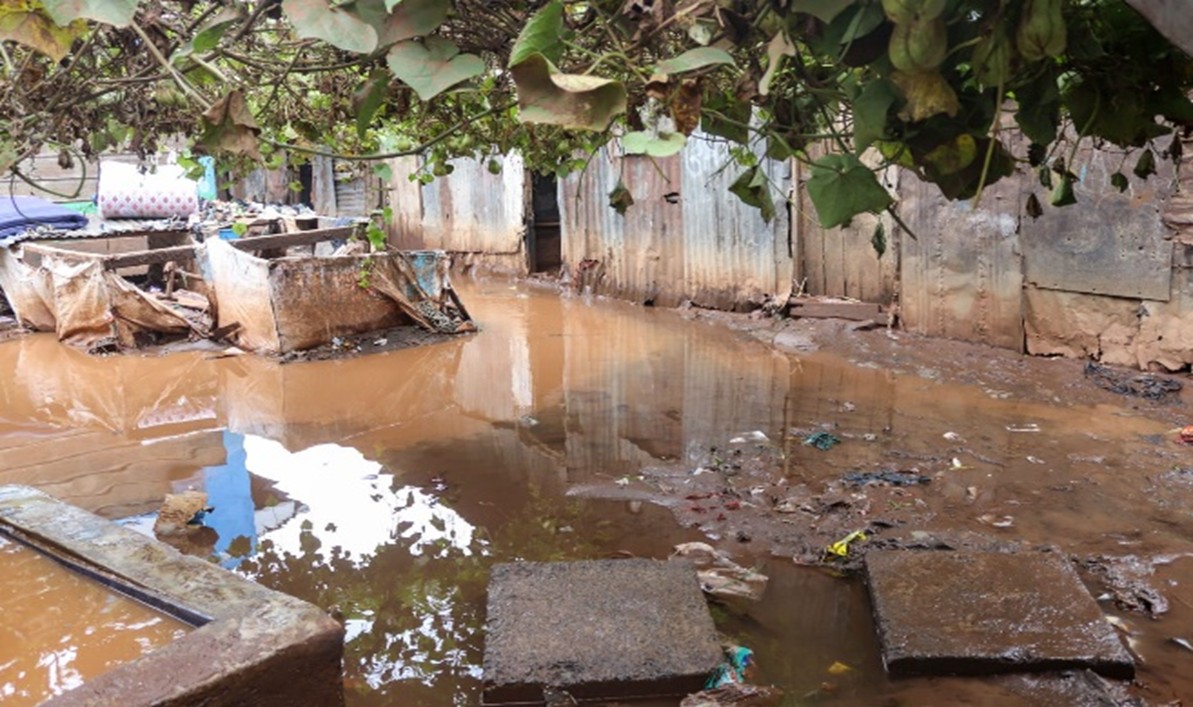
By Wambui
In the heart of Kenya’s Capital, Nairobi, lies Mathare, one of Africa’s largest informal settlements. Life here is a daily struggle with residents facing different challenges from inadequate housing to limited access to basic services. One of the most rampant challenges they recently faced, barely a couple of months back, is flooding, one of the most dominant challenges facing Kenya.
On the night of April 23, 2024, catastrophic rains led to severe flooding in Mathare area, causing widespread devastation. The Nairobi River burst its banks, submerging homes and leaving residents stranded on rooftops. At least a couple of people were reported missing, and many families were displaced as their houses were marooned by the floodwaters. The floods also resulted in significant property damage and heightened public health risks due to contaminated water sources. Residents of Mathare narrate that this is one of the most traumatizing, heartfelt memories etched in their minds.
This flooding is believed to be one of the tell-tale effects of climate change being experienced in Kenya’s Capital, Nairobi and other parts of the country.
Defining climate change and mental health
Climate change can be defined as the long-term shifts in temperature and weather patterns, it poses significant threats to global health. It is characterised by global warming, which goes hand in hand with increased risks of extreme weather events, infectious diseases, food insecurity, and, most importantly, mental health issues. This impacts vulnerable populations disproportionately. Mental health refers to a person’s emotional, psychological, and social well-being. It is further explained by its effects on how individuals think, feel, and behave in daily life, as well as how they handle stressors, relate to others, and make decisions.
I had an opportunity to engage a couple of residents who were caught up in the floods as they narrated their sad and harrowing experiences. It is amazing that all of them lived to tell the tale. Sadly, some of their kin and close friends were not as lucky.
To date, we can’t trace some people, we can’t account for them

Joan (not her real name) narrates: On Tuesday night, we experienced a tragedy we have never seen before in Mathare. Mathare was flooded and most houses were swept away. People lost their kin and belongings, till now we can’t trace some people, we can’t account for them, most of these being children. More than three thousand families are still sleeping outside and in camps, and we also lost our comrades, two of whom have been activists championing for human rights and social justice, and more so, dignified lives here in Mathare. One of them was popularly known as mama Victor because she was fighting for justice and for the rights of young people to exist freely in this community and the other comrade was Jesinta who perished together with mama Victor and their children in the same house. Dignified lives and proper housing were some of the areas these comrades were advocating for, terming the lack thereof as structural violence. It is sad they did live to see this through.
Kids were woken up by flood waters on their mattresses and started crying for help

Mary (not her real name) narrates: I was really shocked because I have never seen the river flooded to the point it had reached. It was sadly comical as there was a lot of water and people were still sleeping. Kids were sleeping on the floor and the water flooded while they were still sleeping. The kids were woken up by flood waters soaking their mattresses and started crying for help. I was shocked when I woke up surrounded by flood waters and I didn’t know where to start and what to do. Instinctively, I went outside to rescue the kids, only to find out there was nowhere to step as the water was all over the pathway. I was just left astonished by the incident. All we did was to find a way to get the kids out of the situation. We had to risk jumping over the flooded pathways. My husband wasn’t around. As usual, he left for work, and I was all alone with the kids. I didn’t know it was all flooded all the way up there, where I didn’t expect. That night was very terrifying to me.
My house was swept away

Joseph (not his real name) narrates: As you can see, this is the place I used to call home (as he points at a place where his house once stood). For now, it is all swept away by the water and left bare. All this happened on Tuesday night. I had gone to watch football where Arsenal was playing against Chelsea. The game ended at around midnight. I came back home and slept for around thirty minutes before I was woken up by my brother who for some reason had stayed awake. He told me to wake up as water levels had already risen up to the level of our beddings. I woke up so confused but somehow, the first sobber thought that came on my mind was my neighbours who were living downstream. I was more worried about them because if we were in this position, yet we are on relatively high ground, then it means they were the ones in greater danger than I was. My immediate action was to wake up all the other neighbours close to me, and I marshalled them to rescue the others and made sure everyone was okay, especially those who we knew were deep sleepers. Within about thirty minutes, the whole area was overrun by the flood waters. I had to painstakingly convince everyone that we didn’t have time to rescue our properties as this would be risking our own lives in the process. All we could do was to get up to higher ground where it was safe. We helplessly watched as everything was swept away. This is the biggest tragedy I have experienced so far in my life.
What is the relationship between impacts of floods and mental health?
From the narrations above, it is evident that people were negatively impacted by the floods, and below are the most common results that arose:
- Loss of life and displacement
Fatalities: From official records, at least 40 community members, including children and a person with disability, died in the floods.
Displacement: More than 7,000 people were displaced in Mathare area alone. Many people remain displaced and are living in temporary shelters or with relatives.
Missing Persons: There were reports of missing persons, with the Kenya Red Cross reporting 162 missing persons.
- Economic and property damage
Destruction of homes: Many homes, majority of which were tin shacks, were either marooned in water or swept away completely, leaving families in destitution.
Loss of livelihoods: Floods destroyed businesses and made it difficult for residents to earn a living, impacting food vendors and other small businesses.
Damaged infrastructure: Roads, bridges, schools, and healthcare facilities were damaged or destroyed.
- Contaminated water sources
Flood waters contaminated water sources, posing a risk of waterborne diseases.
- Loss of belongings
Residents lost personal belongings, including important documents and items essential for their livelihoods.
- Social and psychological impacts
Emotional trauma: Residents are still struggling to cope with the scale of destruction and the loss of loved ones and belongings.
Increased child labor: Families struggled to survive, leading to an increase in child labour as children are now being forced to work to supplement the family’s income instead of attending school.
Disrupted education: Schools were damaged or disrupted, impacting the education of children.
Forced evictions: As a safety precaution, residents living near rivers and other flood-prone areas were instructed by the Government to relocate. Those who did not adhere to this instruction were forcibly removed, adding to their suffering.
- Difficulties in rebuilding
Residents are struggling to rebuild their lives and homes, facing challenges in accessing resources and support.
- Increased vulnerability
The floods have made communities more vulnerable to future disasters and economic hardship, with many community members still in need of continued support for food, shelter, clean water, and other essential needs.
This is how these flooding impacts are affecting mental health
In as much as the flooding took place almost a year ago to the date of writing this article, it’s still a wound the people of Mathare have not been able to heal from. They still suffer from the consequences of the floods which affected them both physically and psychologically.
Thanks to initiatives such as the Race to Resilience initiative brought to us by non-profit organizations such as Basic Needs Basic Rights Kenya, Tabasamu Café and Muungano Wa Wanavijiji – SDI Kenya, we have gotten to learn about mental health and how to help people cope with stressors that impact mental health.
Some of the post-flood mental health challenges we have noted that people are trying to fight and cope with include:
- Anxiety and depression: The stress of displacement, property loss, and uncertainty about the future has contributed to heightened anxiety and depressive symptoms.
- Post-Traumatic Stress Disorder (PTSD): Witnessing or experiencing life-threatening situations during floods has left some people with PTSD, characterized by flashbacks, nightmares, and severe anxiety especially when it rains.
- Sleep Disturbances: Stress and anxiety following the night of the flood has disrupted sleep patterns, leading to insomnia or other sleep-related issues.
- Substance Abuse: Some individuals have turned to alcohol or drugs as coping mechanisms, potentially leading to substance use and abuse problems.
- Social Isolation: Displacement and the breakdown of community networks has resulted in feelings of loneliness and isolation.
Effects compounded for vulnerable populations
- Children and adolescents: Young people are experience heightened fear, confusion, and stress, potentially leading to long-term psychological effects.
- Older adults: Elderly individuals are facing compounded stress due to mobility issues, health concerns, and the emotional impact of losing lifelong possessions.
- Low-income communities: Limited access to resources continues to hinder the recovery efforts thus increasing stress and anxiety.
What strategies can be put in place to mitigate mental health challenges?
- Improving access to mental health services: Providing counselling and psychological support to survivors of the floods will aid in their recovery process.
- Community rebuilding programs: Initiating rebuilding programs and actively engaging communities in these reconstruction efforts will help to restore a sense of control and normalcy.
- Public health interventions: Implementing programs that address both physical and mental health needs post-disaster will be crucial in addressing recovery.
- Strengthening social networks: Encouraging community cohesion to provide emotional support and reduce feelings of isolation will go a long way in promoting recovery.
Let’s not treat mental health as an afterthought

The floods that struck Mathare in April 2024 left behind more than just broken homes, they left behind broken hearts, broken routines, and for many, a broken sense of safety. While the water may have receded, the mental weight of that night still lingers in people’s minds. Behind every ruined structure is a story, a voice, a person still trying to piece things back together emotionally and psychologically.
Listening to survivors like Joan, Mary, and Joseph, it’s clear that to them, this wasn’t just a natural disaster. It was a deeply personal trauma, one layered with years of structural neglect, inequality, and broken promises. Their voices reveal a community that’s not just grieving, but also fighting; fighting to be seen, to be heard, and to heal.
As someone who has spent time speaking with residents and hearing these stories firsthand, what struck me most was the quiet strength beneath the pain. Amidst the loss, there is still hope. There is still resilience. But healing won’t happen in isolation. It requires real investment in mental health care, in community support systems, and in dignified living conditions especially in informal settlements like Mathare.
Moving forward, we must treat mental health not as an afterthought in climate disaster response, but as a central pillar of recovery. Because if we ignore the emotional aftermath, we risk rebuilding walls while leaving people shattered inside. The people of Mathare deserve more than survival, they deserve a future where they can thrive.
About the writer
Wambui is a storyteller, advocate, and changemaker with a deep commitment to justice and community. Her work explores the powerful intersection of climate change, mental health, and grassroots resilience. From documenting the impact of climate change in Mathare to championing mental health wellness and climate action, Wambui ensures that local voices are heard and that lived experiences shape the solutions we need.

